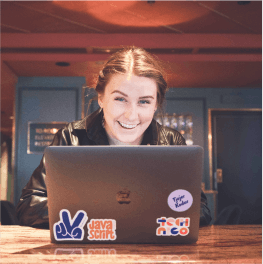
Web development
What Is a Database?
You can describe a database as an organised collection of related information (or data) that is stored in a computer system.
You can then, in an easy way, access, manage and update that data. Usually, a database is controlled by a Database Management System, also known as a DBSM.
To make it a bit easier for you to picture, we could say that your local library is the database, and its collection of books of different genres is the data itself.
This is a database
And what is data? Data is a collection of information that can be used in many different forms. It can be presented as numbers, text, media and much more. Most information systems have the goal of transforming data into information in order to gain knowledge used for decision making. But to be able to do this, the system must be able to take data, put it into context and also provide tools for analysis. This is why databases are designed.
Why do we use databases?
We know that a database makes it easy for us to store and access information. But what more does it do? And why couldn’t we just use a simple spreadsheet to store the data? Both are excellent ways to store data.
“The biggest difference between a spreadsheet and a database is how the data is stored and manipulated, who is allowed to access the data and how much data can be stored.”
A database is accurate. It has all kinds of built-in constraints and checks which mean that the information in a database, in most cases, is guaranteed to be correct.
Updating data in a database is easy. If you need to update data, you can easily do this by using various data manipulation languages, such as SQL.
A database ensures the security of data. Databases have many different methods of ensuring the security of data. Before accessing a database, user logins are required and many access specifiers. Only authorized users can access the database.
Data integrity in a database makes sure that the data is accurate and consistent.
Databases make it easy to research data.
Imagine your favorite online streaming service. This company uses a database to efficiently store their content (movies and TV shows) as well as different tools for financial and analytical purposes such as advertisements.
Try it for yourself
Databases can be hard to grasp and, though you might not realize it, databases are everywhere. They affect our daily lives more than we know. Databases are responsible for many of the services we use on a daily basis, from weather applications to the music we listen to online.
For example, every social media platform stores user information in databases. So, the next time you are on social media, think about what databases are used for. Could it be to recommend friends or businesses? To recommend products or topics? Or, if you browsing your favorite online streaming service, consider if the database would be able to generate a list of TV shows to watch? Would it be able to track individual show preferences and provide a list of recommended shows or movies based on this?




We're a female-founded, remote-first community helping people get a career they love. 90% of those attending our boot camps are women.
